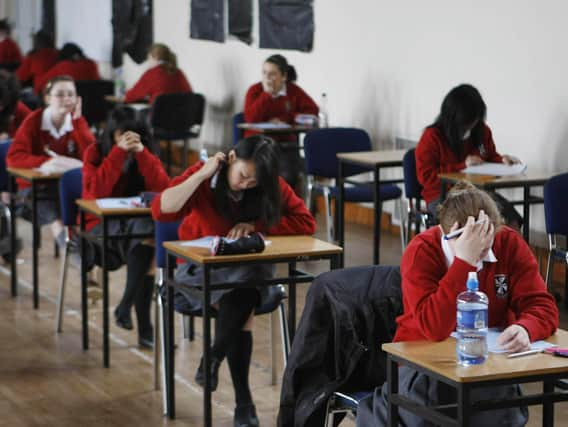Government education policy 'embarrassing' given levelling up plans former minister says, calling for devolved policy


Lord Jim O’Neill of Gatley - an architect of the Northern Powerhouse and vice-chairman of the Northern Powerhouse Partnership - called for parts of education policy to be devolved, following glaring regional disparities in the number of A and A* grades given to A-Level students.
Speaking ahead of today’s GCSE results, Lord O’Neill told The Yorkshire Post: “One of these years a Conservative government is going to wake up and realise you cannot just keep applying the same national strategy (...) to every part of the country.”
Advertisement
Hide AdAdvertisement
Hide Ad“They need to sit back and think. Clearly what they’ve done this year is overcompensate for what they did last year, but not really achieved any different result - the best schools - because they get the best resources - are still overachieving.”
Across the UK almost 45 per cent (44.8 per cent) of A-Level entries were awarded an A or an A* this year following the second year of cancelled exams, up from 38.5 per cent last year.
Across Yorkshire and the Humber, 41.1 per cent of entries got top marks, but the highest rate of As and A*s in England could be found in London and the South-East, where 47.9 per cent and 47.1 per cent of A-levels were given top marks respectively.
Analysis of exam results by the Labour Party showed that teenagers in Yorkshire and the Humber were 26 per cent less likely to be awarded an A* grade in an A - Level than their peers in London.
Advertisement
Hide AdAdvertisement
Hide AdLord O’Neill, former Treasury minister under David Cameron and Theresa May and founding trustee of education charity SHINE said of the results that “it’s not a big surprise, but it’s obviously very disappointing”.
He also called on the Government to “consider devolution about parts of education policy” but admitted it is “likely” that they will not do that, adding that ministers are “not doing anything to really deal with the scale of the challenge in the most educationally disadvantaged parts of the country, many of which are in the Northern Powerhouse.”
He asked: “What is this Government about? What is the proper philosophy of this Government on education? And in the context of levelling up it’s embarrassing. Do we really want to level up or not? Education is the ultimate levelling up.”
Lord O’Neill went on: “It’s very easy to blame this education secretary to be quite honest, but it’s deeper. This has been underlying issue going back since Michael Gove as education secretary and they need to stop this complete obsession with if you’re part of an academy chain then eventually all will be great because it’s quite clear in parts of the north and from what I can see also in parts of the Midlands (…) that that is irrelevant unless you’ve got much more specific tailor-made initiatives that relate to the nature of the area.”
Advertisement
Hide AdAdvertisement
Hide AdToday’s GCSE results follow the second year of cancelled exams as a result of the pandemic.
Last year, 26.2 per cent of UK GCSE entries were awarded one of the three top grades, compared to 20.8 per cent in 2019, the last year that exams were sat before the pandemic.
Girls also pulled further ahead than boys amid the surge in top grades awarded at GCSE last summer.
A spokesperson for the Department for Education said: “After an extraordinary and challenging year, A Level grades this week showed an increase in top grades for students from all backgrounds.
Advertisement
Hide AdAdvertisement
Hide Ad“Since 2011, the government has narrowed the gap between disadvantaged pupils and their peers at every stage of education for every year leading up to the pandemic.” They added: “We need to redouble those efforts which is why we’re already investing record levels of funding into the education system, including £3bn to support our ambitious education recovery plan.”